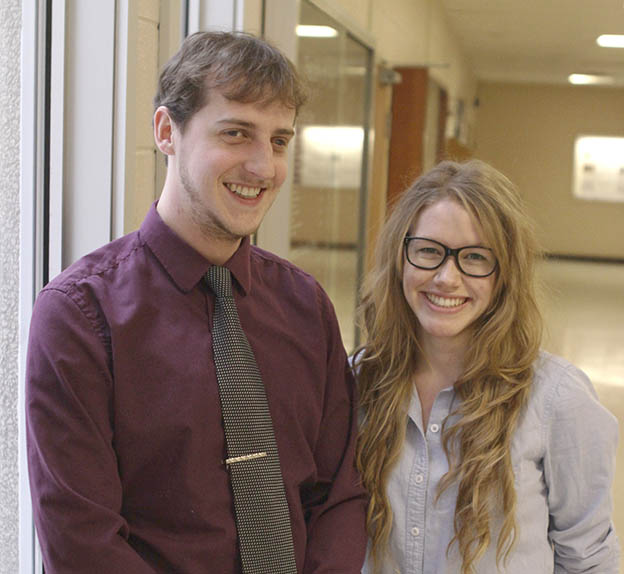New mental health specialization prepares students for clinical work

Kristopher Brazil, left, and Paz Fortier are both in the mental health specialization in Psychology, Neuroscience & Behaviour. The competitive program accepts only a handful of students entering their second year.
Kristopher Brazil always knew he had a certain way with people.
When he was in high school, his friends would turn to him for advice. When he spent a year working in an auto parts factory before university, co-workers shared their troubles and personal stories with him.
“I’ve always enjoyed helping people in any way I can and helping them sort through their problems,” says Brazil, now a fourth-year psychology student. “When I worked in the factory, I got close to a lot of people and I also saw a lot of mental health issues.”
It was an experience that would shape his future.
Eventually, Brazil enrolled in a two-year arts and science program at Mohawk College and ultimately landed at McMaster. He is one of the first students to enroll in the new mental health specialization program now offered in the Department of Psychology, Neuroscience & Behaviour (PNB).
The competitive program accepts only a handful of students who are entering their second-year. Thirteen are now enrolled.
In third year, students are placed in a clinical environment where they work directly with patients who are dealing with a wide range of issues, which can include mood disorders, depression, autism, eating disorders, and others.
Some students work on suicide hotlines, others on youth help hotlines, and still others work on mental health programs within the education system.
Paz Fortier, also in her fourth year, worked with the Hamilton-Wentworth District School Board on a program called “Coping Power,” which helps children with behavioural problems manage aggressive tendencies.
“I’ve always been interested in mental health issues. Why do people turn out the way they do? What are the roles of biology and the environment in development? Is it perhaps a combination of both?” she wonders.
Currently, she is working on a large study in which researchers are exploring the relationship between genetics and social influence. Specifically, they are examining depression in adults and its effect on their own children.
PNB professor David Shore says the mental health specialization is necessary because it differentiates the students within their own department, but more importantly, because it prepares them to enter professions and programs focused on mental health—many hope to obtain a PhD in clinical psychology.
“This will give them an edge,” he says. “We are offering our students a unique perspective on mental health. They graduate with a scientific background, extensive experience in the lab, and a full understanding of the evolution of mental health.”
Along the way, students in the program have one-on-one mentorship opportunities with faculty within the department and with associated members of the department. This experience culminates in a thesis focused in the topic area. Critically, these students graduate with strong research foundation and rich empirical background.
Brazil couldn’t agree more.
“This is my passion,” he says. “Mental health issues are what I would call a ‘screaming problem’ in our society and we know there are huge demands for help.”
“It’s important that we are making it a priority here at the university,” he says.
The program, Honours PNB (Mental Health Specialization), seeks to accept 20 students in Level 2 of each year equally represented in the faculties of science and social sciences.

